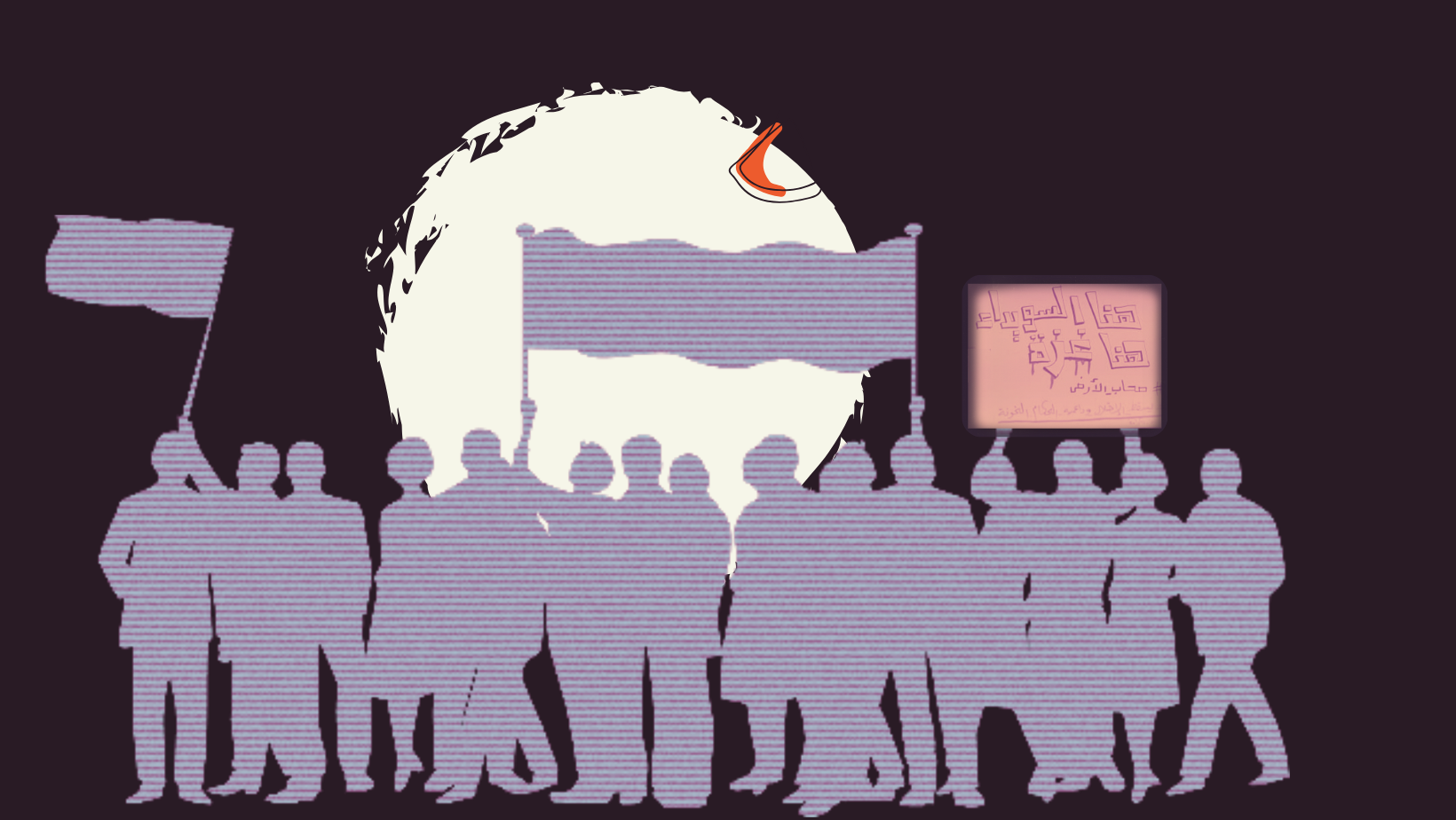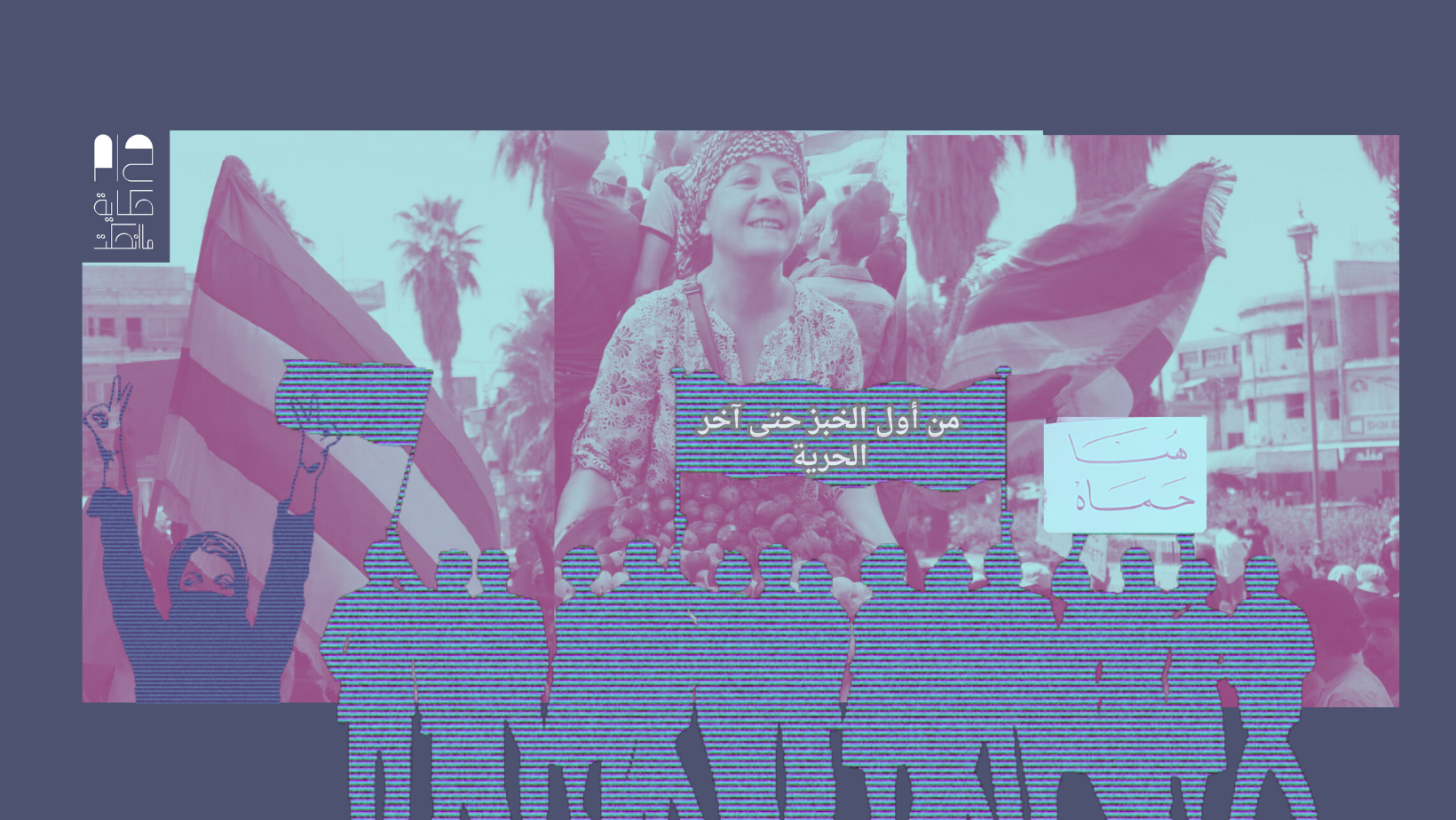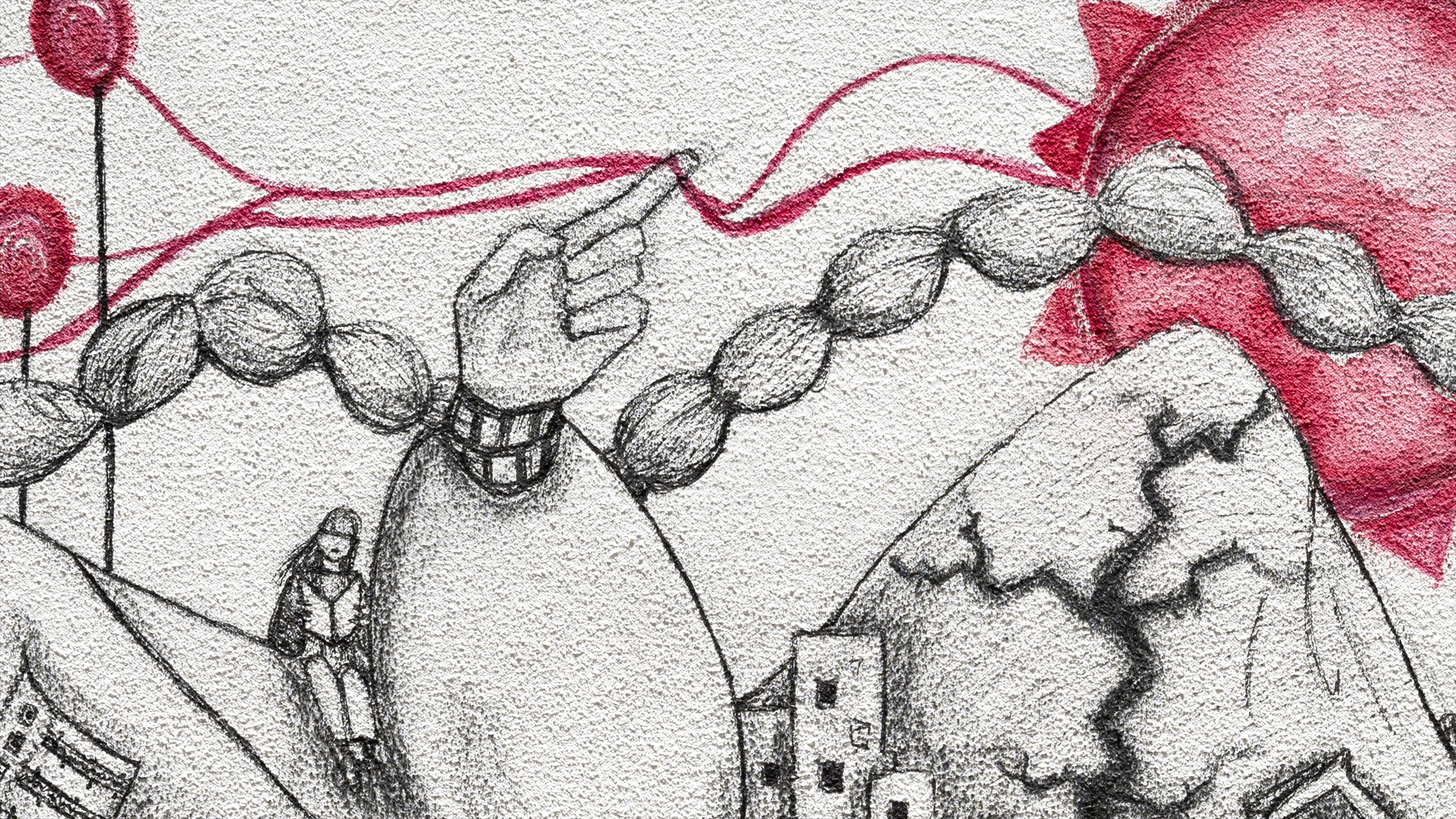While Syrians in the city of Sweida continue their protests for the fourth consecutive month (since August 17, 2023) without direct intervention from Syrian security forces (at least until now), the Syrian regime did not hesitate to arrest the popular poet Hussein Haydar from his home in al-Ghab Plain region (central and western Syria). This arrest was based on his poetic expressions posted on his social media accounts, criticizing the regime's practices and calling for the seizure of the assets of the Assad and Al-Akhras families. Security forces raided his home, arrested him for the second time, seized his mobile phone, and till now, he remains in detention.
Prior to Haydar's arrest, activist Ahmed Ismail was arrested for anti-regime posts on Facebook. His daughters made an appeal for information about him after his arrest by a patrol claiming to be a security force. A few days later, on September 16, security forces also arrested another voice from the village of "Batryas" in the countryside of Jableh, activist Jihad Asaad, for the same reason.
Commenting on these arrests, the opposition lawyer residing in Europe, Issa Ibrahim, stated that “the conflict in Syria has been portrayed by the media and others as a struggle between the "Alawite" regime and a "Sunni" revolution. This necessarily led to alignments that made the movement unable to achieve political change. Now, this binary portrayal gives significant weight to any Alawite movement, and Bashar al-Assad, the son, recognized this. He was aware from the beginning that not all Alawites supported him, and preemptively acted to suppress any genuine Alawite movement, as he did with the early general Syrian movement. He created a locally 'manufactured opposition' as a social trap for the real movement. However, this did not prevent the emergence of genuine Alawite voices, varying along the Syrian coast. Despite being individuals, he directly resorted to arresting them, unlike his manufactured opposition. This was to prevent any possibility for this movement to become widespread, which was very likely, if the arrests didn’t occur. The arrests of individuals without influence may seem insignificant, but their importance lies in breaking the barrier of fear. Therefore, al-Assad Junior, through these arrests, aimed to reinstate that fear."
These almost daily arrests prompted some individuals on Facebook to write public solidarity posts with the previously detained, providing their personal information, phone numbers, and addresses, openly challenging security patrols.
Dr. Rabab Haydar, a professor from Hama working at the Faculty of Agriculture at Tishreen University and one of those who shared their contact information, stated to SyriaUntold that the idea “is to challenge the collective arrests and hold the authorities responsible for these arrests and for the safety of activists.” She emphasized “the necessity of solidarity, especially since the situation has become unbearable, and the authorities no longer care about their supporters from ordinary people.” This marks a relatively new development in how the coastal region deals with arrest issues among those loyal to the regime.
Continuous Arrests and Real Threats
In a casual conversation with a man in his forties wearing a military-style coat on an internal transport bus in Latakia, he commented on the arrest of "Lama Abbas," a pro-regime activist, saying, "If they arrested her, while being part of the regime’s core, they won't spare anyone, as usual. But this time, people are talking about hunger and oppression; there's nothing left to fear or care about except death." Prior to the poet Hussein Haidar’s arrest, there were arrests of activists on social media in the Syrian coastal region. It began with the arrest of Firas Ghanem from al-‘Annaza (Banyas) and the arrest of Lama Abbas, a pro-regime activist and head of a charitable association. She had criticized Iran and Russia in videos for the second time. According to the confidential sources of the investigation’s author, Lama was arrested by direct orders from the palace. These arrests were not isolated incidents, as security patrols in Latakia conducted between July and October 2023 many arrests, which did not find their way to the media, and their exact number remains unknown.
The news of these arrests spread widely on social media and was not surprising to social segments generally uninterested in public affairs.
From Sweida to Gaza... One Uprising
27 November 2023
These continuous comments and tightening measures indicate that the authorities clearly perceive a shift in the stance of the largest bloc in the country—those supporting them, the residents of the Syrian coast and its mountains. They take these changes seriously while intensifying the suppression of any opposition to the regime's policies, even if it's just a "post" on social media. This was evident in a security decision (that remained within security circles, according to the author's private sources) to prohibit any meetings that could lead to protests. This is clearly reflected in the actions of the Political Security forces, who prevented a consultative meeting for the second time (on Friday, August 18, 2023) at the home of the well-known opposition figure, Fateh Jamous, in Bisnada near Latakia. The meeting place was heavily surrounded, and attempts were made to arrest people merely for expressing their desire to attend the meeting. The pretext for the ban was that the consultative meeting, which brings together opposition and pro-regime figures every two weeks since 2014, was unauthorized.
Dr. al-Miqdad Abboud, a university professor and author of "The Syrian Spring," tried to attend the consultative meeting in Bisnada and described the encounter: "We went to the meeting, and there were several policemen, the head of the Political Security branch, and the commander of the group... They prevented me from entering Professor Fateh's house, and I argued with them about the reason for the ban. I said this is a violation of my rights as a citizen, as it is my right to meet whomever I want as long as I am not breaking the law. The commander responded, 'Don't bother yourself; it's forbidden, meaning it's forbidden because you have no authorization for the meeting’.”
In the second incident, they besieged Fateh Jamous' house and the entire village to prevent people from reaching the meeting. Jamous explained what happened: "The meeting was banned in our house twice, with a fifteen-day difference. The goal of both meetings was to invite elites interested in public affairs and in finding solutions to emerge from the crisis to dialogue, including those loyal to the authorities. It was publicly announced in advance. They came with a massive show of force to prevent the meeting, claiming it was an unauthorized gathering. They never entered the house but photographed the IDs of those who attended. The second ban, after fifteen days, was for a meeting by the cadre of the 'Path of Peaceful Change' movement. They came with the same pretext, while the meeting hadn't even started. They didn't enter the house and requested to photograph the IDs of those who had preceded them."
Jamous explained the reason for banning now and not earlier, "I believe it is related to the need to intimidate and prevent any impactful activity, no matter how simple, even if it's within a narrow elite. They remember that the events in Sweida served as a motive for this intimidating and preemptive oppressive behavior. In general, they wanted, through these exaggerated displays, to intimidate the villagers and create a gap between us. At the same time, they spread some rumors that I invited people from outside and that they want to prevent and monitor them, as there is fear of any sabotage activities."
In various areas of the coast, tensions occurred between people and authorities, leading the latter to deploy security patrols as a precaution. At this point, people reached a stage of "we have nothing left to lose; our children are gone, our salaries don't last hours, and our lives have no value," as expressed by the father of one of the young men who were killed in battles alongside the Syrian regime (at the age of forty) during a funeral in Baniyas. What is noteworthy in these new tones is that they directly attribute responsibility to the head of the regime. This might be what has mobilized security groups for a while now, in all coastal cities and their countryside, searching for any voice, even if it's just one voice.
In parallel, people in the city of Tartous ignored Asma al-Assad's visit to the production farm. Landline communications were also cut during al-Assad's visit to the fire-affected areas north of Latakia for the first time in the province's history. Unconfirmed reports from the fire-stricken area indicated the tearing of pictures of the president and his brother.
Reasons for Shifts in Supporters' Positions
There are numerous reasons that have prompted supporters to change their positions, both privately and publicly. As journalist Ahmad (a pseudonym), 46, states, "If there were large youth sectors in the state's regions that lived in neutrality for many years, the economic and social collapse has driven them to change their positions and consider migration."
The youth constitute more than half of the supporters, and they have no ways to solve their problems. The war's conditions have altered their structure. As Hussein (a pseudonym), a 30-year-old engineer in Jableh Spinning Company, puts it: "a large number of coastal youths died during their service in the Syrian army and affiliated forces, numbering in the hundreds of thousands. There is a general sense of injustice among the sons of the Syrian coast, especially those who spent long years in compulsory service and found no work after discharge."
"We have nothing left to lose; our children are gone, our salaries don't last hours, and our lives have no value," as expressed by the father of one of the young men who were killed in battles alongside the Syrian regime (at the age of forty) during a funeral in Baniyas.
This change in the structure of the pro-regime bloc isn't exclusive to the new generations. "Those who lived through the experience, felt it, and even fought in it are from the older generations, from the ages of thirty to sixty. They realized that they were mere tools whose utility had expired. Besides few moral benefits, they gained nothing amid the authority's monopolization of everything in the country, swallowing up resources," says Ali (a pseudonym), recently discharged from mandatory service, from the village of al-Mushrifa near Latakia. Today, according to the same government media, there are increasing resignations from government job sectors, reaching 37% in the education and health sectors and thousands in the textile sector.
All these generations are driven to change their positions due to the "rapid economic deterioration in the areas under Damascus's control," as Dr. Adnan Suleiman from the Faculty of Economics (independent) at Tishreen University, explains. He adds: "the recent doubling of public employee salaries was supposed to raise their monthly salaries to the equivalent of twenty dollars. However, it actually became fifteen dollars (one dollar for about 14,000 Syrian pounds in the black market) after inflation increased five or six times in less than half a month. This followed the removal of all government support for basic goods. Apparently, this salary’s increase for state employees came through imposing new taxes on non-state employees, in return for allowing major traders the freedom to set prices for goods and commodities. For example, the price of table eggs is today 2200 pounds, after being half the price a month ago. Some people changed their eating habits, including yerba mate, the kilo of which reached around eighty thousand pounds (six dollars), and coffee has become a dream with the kilo price reaching one hundred and twenty thousand pounds (8.5 dollars)."
"Recent impromptu decisions taken by the Damascus government to lift support for everything and to cancel the state's protective function in a country ravaged by war for a decade have contributed to raising collective anger among supporters more than others," says independent journalist Ahmad. He adds that "the spread of corruption and nepotism, multiplied several times during the past decade, has turned it into a way of life in supporter communities. Disappointments from failed promises of work and of any kind of change to stop the draining of human and economic resources in the country have also increased. Today, most families are preparing their children to travel and are selling their homes, lands, and properties at low prices, hoping that their children will support them economically in the future."
The figures of financial transfers coming from around the world to regime-controlled areas indicate that life here is not possible without these transfers. According to the Harmoon Center for Contemporary Studies, 70% of Syrians rely on these transfers, and the daily value of these transfers is around six million dollars. The regime strips 20% of it by giving it an exchange rate lower than the black-market rate, about 11,000 pounds for one US dollar (the black market rate is around 14,000 pounds for one US dollar).
What about the Impact of Sweida Protests on the Syrian Coast?
The recent protests in Sweida during their first month have garnered attention and coastal solidarity. Some activists attempted to join these protests, leading to their arrest, including Ayman Fares, who released videos holding Bashar al-Assad and his wife responsible for the current Syrian situation.
However, Dr. Adnan points out that the “appearance of the three-star Syrian flag played a significant role in diminishing coastal interest in Sweida's movement. The flag reminded the coastal residents of the atmosphere of 2011 when divisions among Syrians based on flags began. This time, albeit to a lesser extent, the coast distanced itself from Sweida's protests. The flags caused reluctance and hesitation in accepting these protests although based on legitimate demands. It is certain that the coastal protests will not align with any demonstrations falling under the green flag in any region.”
"The flags caused reluctance and hesitation in accepting these protests although based on legitimate demands. It is certain that the coastal protests will not align with any demonstrations falling under the green flag in any region.”
At the same time, coastal residents acknowledge that Sweida, “was favored by the regime with electricity and services for sectarian reasons, and the coast will not be treated the same way if protests expand”, as the journalist Samer (a pseudonym), working for a local newspaper, explains. He adds: "the authorities view coastal protests, if they spread, as a greater threat compared to their 'soft' handling of Sweida's movement in the province's history. However, this possibility is unlikely for many reasons.”
Is there a resurgence of the 2011 atmosphere?
The coastal region has not witnessed a real rupture with the authority, it was rather its human reservoir throughout the turbulent past decade. According to Engineer Hussein, “what is happening today is a minor change in the stance that has not reached a real transformation in their actual position towards the authority. There is a gradual involvement in implicit and explicit support from many former loyalists in any protest activity, even on social media, except for the active Baathists associated with the authority who live in a state of fear and anticipation. However, all this change still falls short of forming a compelling force against the authority, as Hussein explains. "So far, there is no popular incubator for these voices. They remain individual, isolated, and without societal protection. With time, when these individuals find themselves isolated from society, their voices will fade away, as happened with several activists, exacerbated by security constraints."
Until now, coastal protests have taken on a predominantly demand-based, service-oriented, and economic character, lacking clear political demands. However, these demands “carry a subsistence significance wherein protesters acknowledge the regime's role in causing their dire situation and expect it to be part of the solution. They consider that the regime itself acknowledges the legitimacy of these demands and sees itself responsible for their implementation. The absence of political demands here implies that the rupture with the regime has not occurred yet, and there are those who fear an unclear future in the absence of the regime”, says 56-year-old engineer Youssef (a pseudonym) from the village of “al-Aliqa” in the Baniyas countryside.
Limits of Loyalists' Capabilities
Despite the noticeable shifts in supporters' positions, the possible actions for loyalists are "extremely limited." Engineer Youssef explains that “the loyalist bloc has endured much from the regime, who worked on dismantling their social and human relationships with other Syrians. They find themselves isolated, harshly judged by other Syrians who constantly raise a banner against them, asking "Where were you when we were suffering?" They forget that the repression they endured from the regime is no less than what other Syrians experienced. The hostility displayed by opposing blocs forced them into the worst choices possible, especially in the absence of reference points that could mobilize or change their position, whether social, religious, or political, while emptying public spaces of symbols accepted by everyone.”
In light of the regime's vigilance against any individual attempts to protest, "the ability of loyalists to turn their verbal protests into influential gatherings against the authority is limited. This is because a significant part of this bloc still operates at the heart of the regime's institutions, particularly in its security apparatus. These security employees have family ties and commitments that prevent them, so far, from taking positions or disassociating themselves from the regime. The pretext for their livelihoods, which the regime has constrained them with, is not an unfounded excuse. Therefore, the regime has consistently sought to give them free hand with their families, to clearly prevent them from joining the protesters and to dismantle any attempts to protest or object”, according to Hussein. For example, local reports indicate attempts to gather and demonstrate in several villages surrounding Qardaha (Ninente, Deir Hanna) and Jableh (Bashraghi), which ended with the arrival of Republican Guard in those areas, suppressing those attempts through threats and intimidation.
According to the author’s observations, the arrival of the Republican Guard in Qardaha coincided with the distribution of pamphlets by the Civil Labor Movement and the Free Alawite Officers Movement. It was striking that religious figures were used to calm the situation, urging them to participate and speak on all social and religious occasions about the need for calm, patience, and support for the president. In return, the provision of electricity, water, promises of jobs, and promotions increased.
The second reason for the weak ability of protesting loyalist voices, as Hussein says, is that "these voices lack any horizon or political awareness; they are no more than a reaction to what happened. This is due to the absence of any political organization capable of crystallizing this general discontent into public opinion that could form political stances exerting pressure on the Syrian regime."









